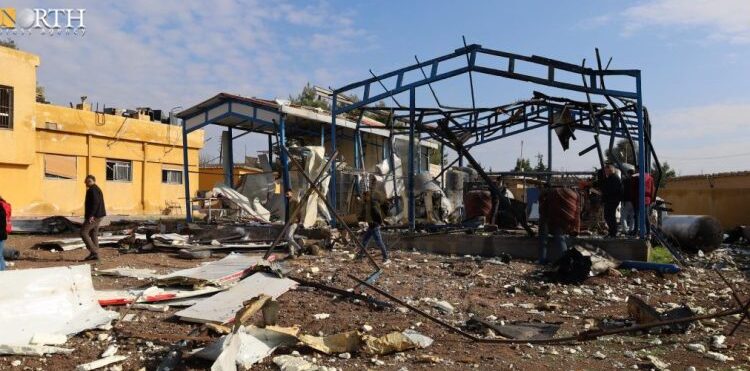The Turkish bombardment on northeastern Syria has deliberately targeted infrastructure and service facilities, as well as small projects, damaging the economy of the region.
Within a span of three days, starting from Dec. 25, 2023, Turkey launched airstrikes and artillery shelling in northeastern Syria. According to the Monitoring and Documentation Department of North Press, the Turkish bombardment targeted a total of 121 sites, with a total of 179 strikes.
All of the targeted sites are located within the areas held by the Autonomous Administration of North and East Syria (AANES).
Small projects
The recent wave of airstrikes targeted 33 sites, including an industrial facility in the Allaya neighborhood near a prison that detains militants of the Islamic State (ISIS), Simav printing house, grain silos, a cement facility, a mill, a clothing factory, and the train station in the city of Qamishli. In addition, the Turkish forces bombed the village of Segerka and a cement factory in the village of Shork in the east of Qamishli.
In Amuda, the Turkish strikes targeted Karam wedding hall, Rohlat Alo olive oil factory, and a site on the Amuda-Hasakah road. In addition, the strikes hit the village of Mehrkan in the countryside of Tirbe Spiyeh (al-Qahtaniya) and a car garage in the city of Kobani, northern Syria.
Marwan Gerges, the owner of Karam Wedding Hall, told North Press, “We were celebrating Christmas in our homes when Turkey bombed the hall. I am a Syriac Christian and have no affiliation with any party. The hall was a source of income for seven families, and we suffered significant financial losses.”
On the outskirts of Qamishli, a facility serving as both a mill and a cotton gin in the village of Umm al-Fursan was targeted during working hours, resulting in injuries to two workers and the killing of one female worker.
Ahmad al-Muhaymid, the owner of the facility, told North Press that worker Aya al-Sab’awi was killed in the strike, while two other workers were injured. “We are civilians and have no affiliation with any military or political party. In addition, I have incurred material losses exceeding $10,000,” he said.
A straw factory in Qamishli was also subjected to an attack, leading to the burning of straw and significant damage to machinery, power generators, as well as the interior and exterior ceilings of the factory.
Mazen, the owner of the straw factory, told North Press, “My workshop is a private project located next to my house. Neither my workers nor I have any affiliation with any military group. Fortunately, my 10 workers were not present in the factory during the attack due to the Christmas holiday; otherwise, there would have been casualties. I have incurred material losses exceeding $30,000.”
Halting investment
Given the fact that most of the population of northeastern Syria live below the poverty line, economic researcher Khorshid Alika said that the Turkish attacks have only worsened the situation by targeting vital service facilities. As a result, the region has been rendered devastated, further amplifying the struggles faced by the already impoverished population.
The economic expert further added to North Press that gas, oil, and electricity production will decline in the region, and their prices will increase in the black market. The AANES will not be able to provide them to the people at the required level and consequently, this will affect the lives of the population.
Alika said the Turkish bombardment on the region has led to significant economic repercussions, including a surge in the cost of goods, food products, and transportation due to fuel shortages. Furthermore, the scarcity of fuel has resulted in frequent power outages for the majority of cities and towns in the region, with certain areas experiencing zero hours of electricity per day.
The repercussions of the situation include day laborers facing challenges in securing continuous work opportunities, as well as the complete cessation of construction, urban development, and renovation projects. Moreover, investment in the region has come to a halt, and investors lack the intention to expand their projects abroad.
According to the economic expert, the ongoing Turkish targeting has led to the forced sale of properties and lands belonging to hundreds of families, pushing them to consider migration to Europe as a means to escape the dire circumstances. Additionally, individuals who had previously purchased lands and properties in the region, while residing abroad, now intend to sell their investments and redirect their capital overseas.
The expert holds that Turkey’s deliberate targeting of the region’s infrastructure aim at hindering the AANES from utilizing available resources to finance its budget, support service institutions, and pay their employees. This strategy attempts to portray the AANES as a failed entity incapable of effectively managing its regions.

